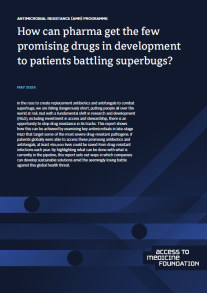How can pharma get the few promising drugs in development to patients battling superbugs?
Date
23 May 2024
This new report from the Foundation’s Antimicrobial Resistance (AMR) Programme has tracked four innovative, late-stage R&D projects across the pipelines of GSK, F2G, Innoviva and Venatorx (cefepime-taniborbactam, gepotidacin, olorofim and zoliflodacin, respectively) as well as Pfizer’s recently approved aztreonam-avibactam (Emblaveo®).
Collectively, these projects could save at least 160,000* lives each year by providing much-needed medicines to treat drug-resistant gonorrhoea, urinary tract infections, intra-abdominal infections, respiratory infections and invasive fungal infections. While these diseases and syndromes affect a wide range of patients globally, women and children – especially those living in low- and middle-income countries (LMICs) – are disproportionately affected.
To save as many lives as possible, it is vital to ensure these much-needed medicines reach the patients who need them most, particularly in countries that face the highest burden of drug resistance. To achieve this, companies need to develop comprehensive access and stewardship plans during clinical development to make sure these drugs are made available and stay effective for as long as possible once they make it to market.
By analysing the depth and breadth of these five companies’ access and stewardship planning, specifically whether patients in LMICs are being prioritised, the report identifies where efforts need to be scaled and how shortcomings can be addressed.
What’s in the report?
Five case studies: The report focuses on five projects from F2G, GSK, Innoviva, Pfizer and Venatorx, highlighting which elements of their current access and stewardship planning are on track – and identifying what needs to be done to ensure they address gaps in these plans.
Four key findings: Based on the analysis of the case studies, the Foundation has identified that detailed access and stewardship planning during late-stage development of antibiotics and antifungals has not become standard yet. Four findings gleaned from the Foundation’s assessment highlight examples of positive steps that are being taken, as well as gaps that need to be addressed. These insights can help to ensure that the much-needed antibiotics and antifungals in the pipeline reach the estimated 1.27 million people who die annually from drug resistant infections.
Spotlight on large research-based pharmaceutical companies: Most large pharmaceutical companies have closed their doors on antibacterial and antifungal R&D and minimised their investments to acquire promising small- and medium-sized enterprises (SMEs). This has not only left a major gap in innovation, but also a major gap in delivering new products to patients. The report includes a ‘Spotlight’ section, in which the Foundation unpacks the urgent need for resources and efforts from big pharma to drive innovation and help reach all eligible patients sustainably.
Recommendations: The report identifies opportunities and recommendations for companies in focus and sets out actionable steps for peers and other global stakeholders in antimicrobial R&D to promote widespread adoption of advance access and stewardship planning.
*This number is based on the number of annual deaths per syndrome due to the resistant pathogens that are specifically targeted by the projects in scope. The data is derived from the estimated global burden of bacterial antimicrobial resistance in 2019 by the Institute for Health Metrics and Evaluation. Note that the number of deaths due to invasive aspergillosis caused by drug resistant Aspergillosis spp. is not estimated and therefore not included.
About the Antimicrobial Resistance Programme
This report is part of the Access to Medicine Foundation’s Antimicrobial Resistance (AMR) Programme, which works to move pharmaceutical companies in responding to the growing challenge of drug-resistant infections. The AMR Programme’s publications – including both the AMR Benchmark (published in 2018, 2020 and 2021) and targeted thematic reports such as this – focus on how pharmaceutical companies perform in terms of taking action on identified priorities to address AMR.

Marijn Verhoef
Director of Private Sector Engagement
mverhoef@accesstomedicinefoundation.org
Get in touch